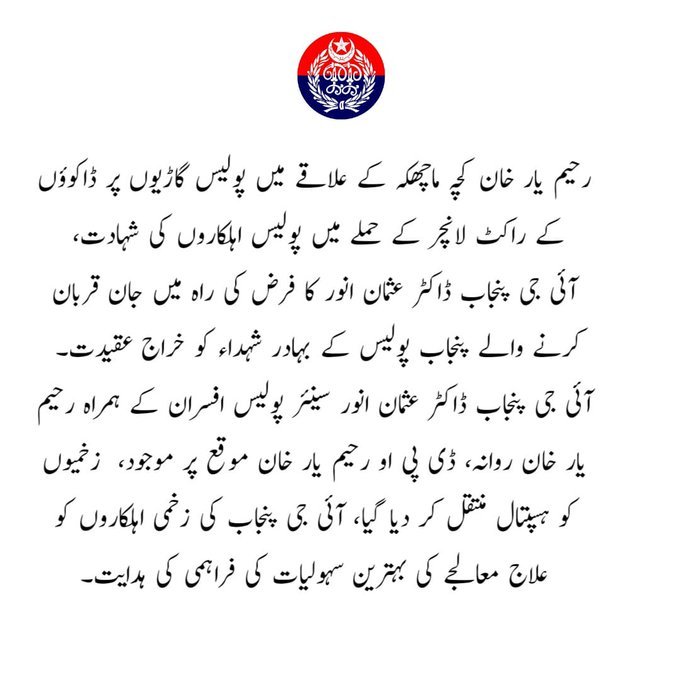Eleven policemen were martyred and seven were injured as a result of an ambush by riverine dacoits in the Machka area of Punjab’s Rahim Yar Khan on Thursday, police said.
Bahawalpur Regional Police Officer (RPO) Rai Babar Saeed confirmed to Dawn.com that “11 personnel were martyred and seven were injured in the attack.”
A statement from the Punjab police said that two police vans were returning from weekly duties in Rahim Yar Khan’s riverine Machka area when one of the vehicles developed a malfunction, after which sudden rocket attacks occurred.
It added that the Rahim Yar Khan district police officer was present at the scene, while Punjab Inspector General of Police Dr Usman Anwar took notice of the incident, requested a report from the Bahawalpur RPO, and proceeded to the location with several other senior police officials.
The injured were transported for treatment, and the Punjab police chief ordered that they be provided with the best possible medical facilities.

Condemning the attack, Punjab Chief Minister Maryam Nawaz vowed that it would not go “unavenged”.
“Sacrifices of police personnel will always be remembered,” she said, directing the authorities concerned to take immediate action to recover the missing policemen. CM Maryam also sought an immediate report from IG Anwar on the matter.
President Asif Ali Zardari strongly condemned the attack and extended his condolences to the families of the martyred police officers.
The president emphasised the need for strict action against criminals in the riverine area and warned that attacks on personnel of police and law enforcement agencies would not be tolerated.
Condemning the attack, Prime Minister Shehbaz Sharif ordered that “immediate and effective action” be taken against riverine bandits.
“The gruesome attack on Punjab police in riverine area is not only condemned as minister of interior but also as a patriotic Pakistani. The attack, which has resulted in a heavy loss of life, shows the unwavering commitment of the police force to fight with such a menace,” said Interior Minister Mohsin Naqvi.
Sindh Chief Minister Murad Ali Shah directed Sindh IG Ghulam Nabi Memon to contact the Punjab police and said any required assistance should be provided immediately.
“Sindh, Punjab and Balochistan police should plan a joint operation against dacoits. Punjab police is as brave as Sindh police, both have always fought against terrorism and dacoits,” he said, adding that the Sindh government was ready to cooperate in every way if the injured policemen needed treatment.
Meanwhile, a statement from Sindh Home Minister Ziaul Hasan Lanjar ordered that the provincial police remain on high alert until further orders amid the incident.
“The morale of the officers and youths cannot be lowered by the martyrdom of the policemen,” he said.
IG Memon said the “cowardly act is an attack on the common strategy and unity of the police force”. “It is a war of good and evil in which Punjab and Sindh police are working together,” he added.
Earlier this month, three policemen were killed by riverine dacoits in an attack on a police check post at the river Indus protective spur near Bhong.
After the attack, a police party began chasing the dacoits, and after an exchange of heavy firing, the police claimed to have recovered a body from a field, which was later identified as Samundar Indhar, a member of the notorious Indhar gang of dacoits.
Last month, a police official was martyred while four dacoits were killed by the Punjab police during an operation in the Machka area.
A statement from the Rahimyar Khan police spokesperson said that Machaka Station House Officer Sub-Inspector Mohammad Ramzan died from a heart attack during the operation while four dacoits of the Shar gang were gunned down.
In April, a meeting of the National Action Plan Implementation Review Committee at the National Counter Terrorism Authority (Nacta) headquarters had decided to launch another joint operation against the notorious dacoits of Sindh’s riverine area.
The interior minister had said that in order to eradicate terrorism, institutions would be equipped with modern technology while the federal government would provide all possible support to provinces in this regard.

